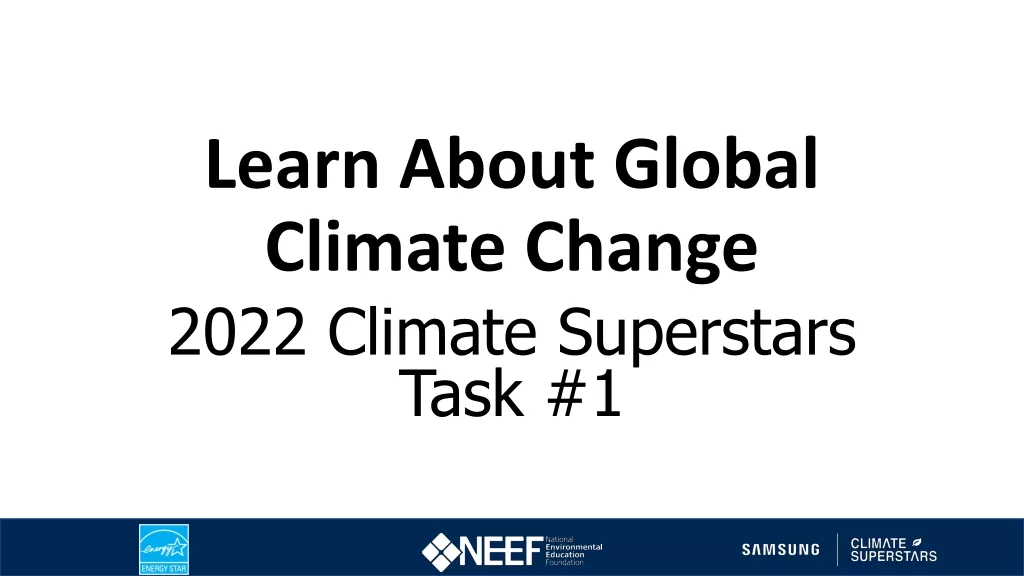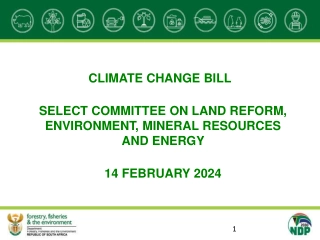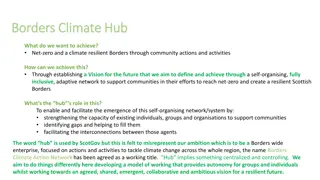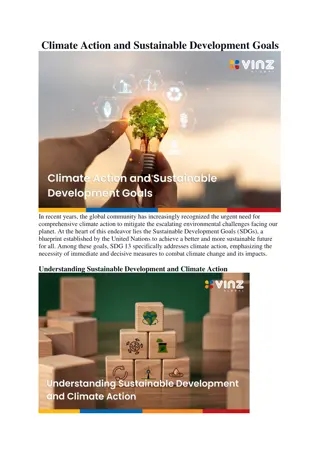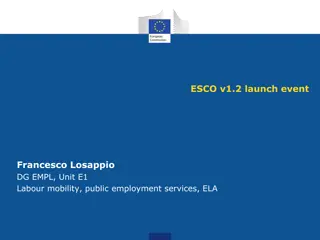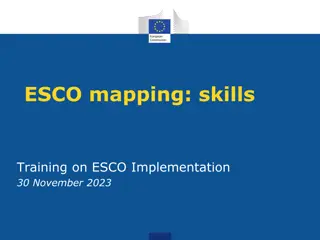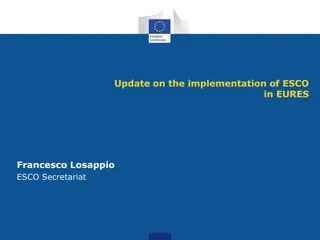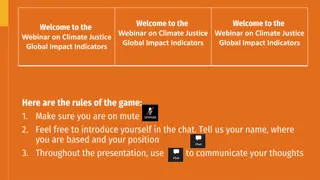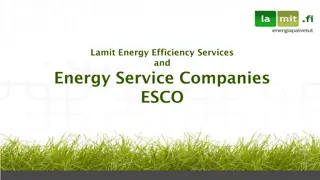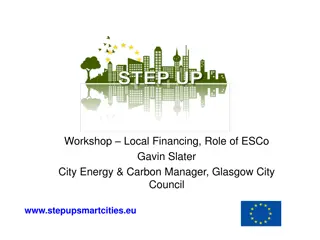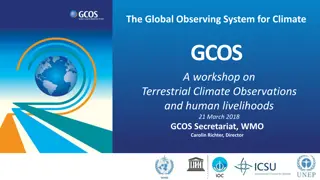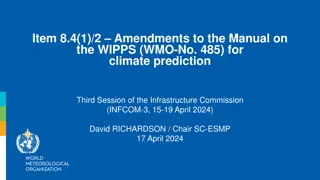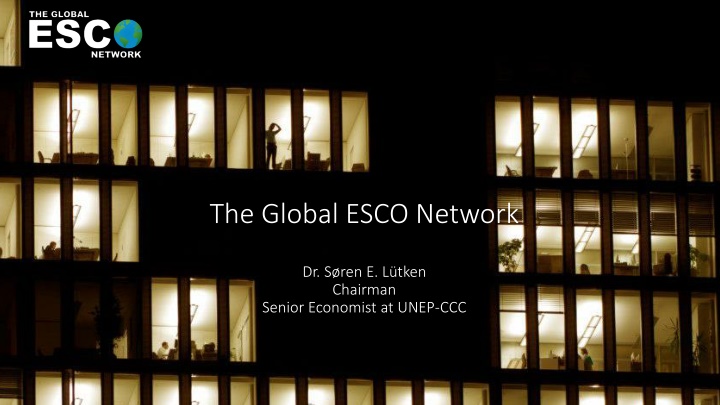
Global ESCO Network - Driving Climate Action
The Global ESCO Network, led by Dr. Søren E. Lütken, aims to inspire government actions in scaling up ESCOs to mitigate climate change. By unifying energy efficiency efforts and addressing regulatory barriers, the network advocates for market-driven solutions over costly grants.
Download Presentation

Please find below an Image/Link to download the presentation.
The content on the website is provided AS IS for your information and personal use only. It may not be sold, licensed, or shared on other websites without obtaining consent from the author. If you encounter any issues during the download, it is possible that the publisher has removed the file from their server.
You are allowed to download the files provided on this website for personal or commercial use, subject to the condition that they are used lawfully. All files are the property of their respective owners.
The content on the website is provided AS IS for your information and personal use only. It may not be sold, licensed, or shared on other websites without obtaining consent from the author.
E N D
Presentation Transcript
The Global ESCO Network Dr. S ren E. L tken Chairman Senior Economist at UNEP-CCC
The case for establishing the Global ESCO Network with a Vision Statement To be the global driver and inspire government actions for scaling up the contribution of ESCOs to the global response for mitigating the threat of climate change
The case for establishing the Global ESCO Network with a Vision Statement To be the global driver and inspire government actions for scaling up the contribution of ESCOs to the global response for mitigating the threat of climate change
The Global ESCO Network considers the Energy Service Companies the answer to the demand side challenge for a number of reasons: the energy efficiency agenda is fragmented - energy efficient technology comes in all forms and applications Energy efficient technologies are a multitude, they are commonly invisible when installed, oftentimes not understood even by the people who use them ESCOs are the unifying term. Do not consider what to install; only consider how to make the market work
Avoid the energy efficiency grants They are expensive to the government. Therefore, they are commonly temporary. And therefore, they send stop-go signals to the market preventing efficient supply. And they discourage investment without a grant. In addition, they are commonly single- technology focused, promoting sub-optimal solutions. And they distort competition with the professional market.
Mapping Regulation that is targeted ESCOs Regulation that is not targeted ESCOs, but affect them anyway, and Regulation that is missing, but which could influence or directly promote ESCOs. Regulatory Barriers for Energy Service Companies 2023 (2nd edition) - Global ESCO Network (unepccc.org)
Draft Policy Advice: An ESCO definition An official accreditation scheme A standard contract (or a suite of model contracts) A non-discriminative procurement policy Non-discriminative or dedicated financing options A clarification on accounting and taxation rules
ESCO DEFINITION An Energy service company (ESCO) is a legal entity that delivers energy services and energy efficiency improvement measures in a user s facility, premises and operations and accepts some degree of financial risk in so doing. The implemented services and improvement measures are based upon an holistic analysis of the users energy and resource demand, against financially and technically viable alternative energy and resource efficient low-carbon technologies, and/or energy management systems. The payment for the services delivered is based (either wholly or in part) on the measured and verified achievement of energy efficiency improvements and of any other agreed performance criteria.
ESCO ACCREDITATIONANDREGISTRY The Global ESCO Network recommends that an official, national ESCO registry is established and that it contains at least the following information: - A list of accredited ESCOs with any accreditation classification they have earned - Performance feedback on ESCOs from users - - - Information about the process to become accredited The Ethical Statement that accredited ESCOs have agreed to follow ESCO primary contact information - A dispute resolution window
A STANDARD CONTRACT The Global ESCO Network recommends that standard contracts are developed and authorized by a government entity for use, with the goals: to provide tools for quality, transparency and effectiveness in Energy Performance Improvement Actions to adopt a contractual framework for energy services companies that provides a clear and transparent risk allocation and guaranteed energy efficiency improvement and any other agreed energy performance criteria to have a reference contractual framework between user and energy service companies that clearly specify value generation (including multiple benefits or co-benefits of energy efficiency improvements) and risk allocation to help assessing the value of the asset in relation to its energy efficiency and sustainability performance for the project lifetime.
PROCUREMENT POLICY he Global ESCO Network recommends that governments and policymakers review the existing procurement and budgeting frameworks and ensure that: Public agencies are able to directly procure ESCO services within the confines of government procurement regulations. ESCO contract durations are not capped by rigid multi-year contracting limitations. Energy (and maintenance) savings can be deployed to pay for ESCO services. Innovative procurement modalities such as PPP and JV transactions are enabled to optimize the mobilization of private sector capital and knowledge resources for public sector energy efficiency projects.
FINANCING TO FACILITATE AND PROMOTE ESCO OPERATIONS The Global ESCO Network recommends that governments and financing institutions together explore the feasibility and benefits of the various financing mechanisms that can facilitate the availability of affordable and sustainable financing, including government policies or initiatives that can underpin it, and implement the most suitable mechanism in their countries to help the scaling up of ESCO projects. These include: Energy efficiency revolving funds (EERF) Energy efficiency (EE) credit lines Credit or risk guarantees to commercial financing institutions (FIs) Super ESCOs Forfaiting through a fund for the securitization and purchase of ESCO cash flows
CLARIFICATION OF ACCOUNTING, FISCAL AND TAXATION ISSUES The Global ESCO Network recommends that accounting, fiscal and tax experts with particular knowledge of ESCOs and Energy Performance Contracts in a targeted country are consulted for the clarification and that their advice be incorporated into standard contract models in each jurisdiction for the benefits of all stakeholders.
Mandatory Energy Audits Not part of the policy advice, but increasingly used by countries. Mandatory implementation Some countries even move to mandatory implementation of audit results, such as India and Philippines
For further information, please contact: The Global ESCO Network S ren E. L tken Soren.lutken@un.org ph. +45 45 33 52 79 www.globalesconetwork.org


